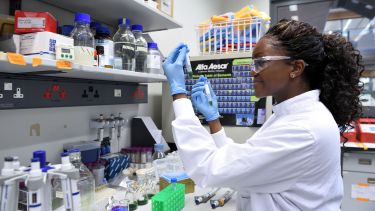The best thing about being an engineer? Having that trained analytical mindset to solve problems in a systematic way.

Read: our interview with Emanga
Why did you want to be an engineer?
Growing up I enjoyed the STEM subjects, but never did I think it would lead me down the path I ultimately ended up on. I studied environmental science for my undergraduate studies – which is a broad field, so I tailored my modules to focus on engineering modules with an analytical focus, leading me to do my PhD in Chemical and Biological Engineering at Sheffield University.
Why did you choose to study at the University of Sheffield and Chemical Engineering in particular?
When I decided to undertake a PhD, I focused more on what my interests were, where my skills lay and areas where I wanted to gain more knowledge. I wanted to do my PhD on a topic with a significant real-world impact – and preferably within the remit of food security.
The University of Sheffield was an easy choice - it is one of the top 3 universities in the country for Chemical and Biological Engineering and not only that, I was being offered a scholarship to carry out an interdisciplinary PhD with my second department being the department of Animal and Plant Sciences, which is also world renowned.
How has your PhD from Sheffield helped you in your current role at Imperial Defra?
In my current role as a Defra Scientist, I am part of the Government Science and Engineering Profession (GSE). Part of my role involves identifying opportunities where economic growth and environmental sustainability can be driven by innovation and where technological solutions are needed. I am constantly applying all the skills I’ve learned throughout my academic career, particularly from my PhD. I am able to bring in my technical expertise into government decision making as well as apply an engineering mindset to problem solving.
What has been the highlight of your engineering journey so far?
A highlight was gaining my PhD and then also being given the opportunity to talk about my research on the BBC Horizon documentary ‘Feast to Save the Planet’.
I have also enjoyed the outreach aspect – where I engaged with the general public on engineering topics during the ‘Science and Engineering week’ as well as delivered taught content and engaged with undergraduate students, in multidisciplinary and multinational groups, at the Global Engineering Challenge (GEC) and Engineering You’re Hired (EYH) student weeks to develop solutions to problems faced by communities across the world.
Also, working with Twig Education, to produce a module on algae blooms and fertilisers and food security, as well as to highlight the importance of STEM education to middle school students was also a highlight.
What’s your favourite memory of Sheffield?
I have so many favourite memories to choose from of my time at Sheffield. From my first day, when I met friends who would ultimately become lifelong friends, to taking long walks in the Peaks and around the city (Sheffield round walk!), the steep hills - I remember carrying buckets of algae samples between the Arthur Willis Environment Centre and Robert Hadfield Building (wasn’t easy, but now I can only look back and laugh – this was also before they introduced the bikes!). Sheffield was a great place to live and a place that I hold so many fond memories of.
What’s the best thing about being an engineer?
Having that trained analytical mindset to solve problems in a systematic way. Engineering gives you the tools to do that.
We interviewed Emanga in May 2022.

